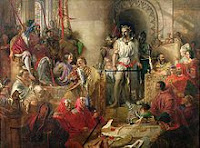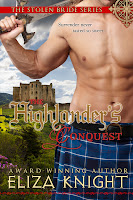Many years ago, tired of the oppression upon his country, a man rose up from the shadows, one without a well-known name, seemingly from nowhere, and led his country in the Scottish Wars for Independence. That man, is now a household name: Sir William Wallace, aka Braveheart.
There is not much known of Wallace and his earlier days. It is thought that he grew up in a family of means—they were landholders. Wallace would have been exposed to the sort of education that a lower gentry family would have. He’d have trained with a sword as well, which also explains why he was so great with wielding one—comes with practice.
No one is sure of his parentage, other than his father was either Alan or Malcolm Wallace and his birthdate is unknown; however it is believed he was in his twenties when he died.
Through William’s early childhood years, Scotland was ruled by King Alexander III, and was relatively peaceful. However, with the King’s death in 1286, Scotland was thrown into turmoil. King Alexander’s heir was a young girl who passed on her way to Scotland to sit upon her throne. In stepped King Edward of England, better known as Longshanks. Brutality was about to begin as the English king sought to take control of the country and weed the Scots from their own lands.
It is my guess that William was between the ages of 6 and 10 at this time, old enough to witness the new brutality and to remember a time when Scotland was ruled by its own people.

At some point, Wallace joined up with Andrew Moray, another leader in the war, declaring his intentions to help lead the country to freedom. There is some speculation about his reason behind joining the revolt, and a legend that whispers from one shore to the next of a wife or love of his that was murdered by the English. There is no proof of this, but I like to believe it because it’s romantic and softens the brutality of war, heightens our beliefs in the violence that must be unleashed.
What is more likely, is that William Wallace was devoted to his country. He remembered growing up in peace and wished for any children he might have to live the same way. He wanted the English king out. He wanted a Scots king in.
 His first act against the English was in May 1297 when he executed the High Sheriff of Lanark. My novel, The Highlander’s Reward (Stolen Bride Series) begins in September 1297 on the eve of the Battle at Stirling Bridge. Wallace would have been between 17 and 22 at the time. I’m leaning more toward the latter, which puts him at 29 at his death. My reasoning behind this is that he would have been a more seasoned warrior, more capable at age 22 rather than 17 to take on a leading role. (*Of note: most portrait depictions of Wallace put him much older, which is misleading—the portraits were also done years after his death.) Wallace is described by contemporary accounts as being a rather giant of a man—perhaps 6’5 or 6’6 and well-muscled.
His first act against the English was in May 1297 when he executed the High Sheriff of Lanark. My novel, The Highlander’s Reward (Stolen Bride Series) begins in September 1297 on the eve of the Battle at Stirling Bridge. Wallace would have been between 17 and 22 at the time. I’m leaning more toward the latter, which puts him at 29 at his death. My reasoning behind this is that he would have been a more seasoned warrior, more capable at age 22 rather than 17 to take on a leading role. (*Of note: most portrait depictions of Wallace put him much older, which is misleading—the portraits were also done years after his death.) Wallace is described by contemporary accounts as being a rather giant of a man—perhaps 6’5 or 6’6 and well-muscled.
It is probable that prior to the Scottish Wars for Independence that he had some military experience, but none are recorded. He and Moray were victorious, however Moray died sometime later of the wounds he sustained. My hero, Magnus Sutherland, was instrumental in helping the Scots to win this battle, and it’s the first time he meets Wallace, but not the last. In fact, Wallace will play a part in each book in the Stolen Bride series.
Prior to Moray’s death, he and Wallace were named the Guardians of Scotland. By the end of 1297 early 1298, William Wallace was knighted by one of the leading Scottish earls, Lennox, Carrick or Strathearn. In 1298, Wallace lost the Battle of Falkirk against the English, but did not allow that to deter him. He gave over his guardianship of Scotland to Robert the Bruce, putting his full support behind the Bruce, but continued to play a part in the war for freedom.

Unfortunately, Wallace would not live to see his dream of freedom realized. He was caught and subsequently executed by the English in 1305—his charge, treason against the crown. While he did not live to see it, the dream lived on and freedom reigned in 1328…until the next war.
THE HIGHLANDER’S REWARD

She belonged to another… But was destined to be his…
Lady Arbella de Mowbray abhors the idea of marrying an English noble occupying Scotland. When she arrives in Stirling, she is thrown into the midst of a full battle between the Scots and the English. Besieged by rebels, she is whisked from her horse by a Highland warrior who promises her safety. But when he kisses her she fears she’s more in danger of losing herself.
The last thing Magnus Sutherland wants is to marry the beautiful English lass he saved. As the laird of his clan, he has a responsibility to his clan and allies. But when Arbella is attacked by one of his own men, he determines the only way to keep her safe is to make her his. A decision that promises to be extremely satisfying.

Magnus brings Arbella to his home of Dunrobin Castle in the Highlands. And that’s where the trouble begins… Their countries are at war and they should be each other’s enemy. Neither one considered their mock marriage would grow into a deeply passionate love. What’s more, they were both unhappily betrothed and those who’ve been scorned are out for revenge. Can their new found love keep them together or will their enemies tear them apart?
Buy Links: Amazon / Barnes and Noble / Smashwords
ABOUT THE AUTHOR:
Eliza Knight is the multi-published author of sizzling historical romance and erotic romance. While not reading, writing or researching for her latest book, she chases after her three children. In her spare time (if there is such a thing…) she likes daydreaming, wine-tasting, traveling, hiking, staring at the stars, watching movies, shopping and visiting with family and friends. She lives atop a small mountain, and enjoys cold winter nights when she can curl up in front of a roaring fire with her own knight in shining armor. Visit Eliza at www.elizaknight.com or her historical blog History Undressed: www.historyundressed.com Twitter: @ElizaKnight and Facebook: https://www.facebook.com/elizaknightauthor
![]() Tweet This Post
Tweet This Post



The topic is good. Thank a lots!